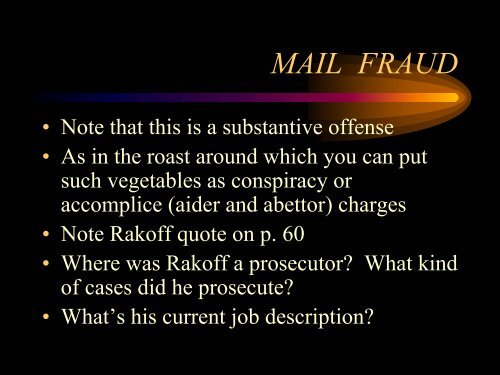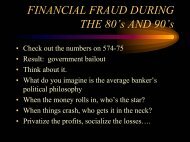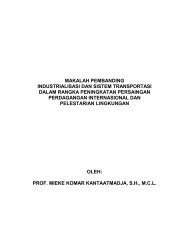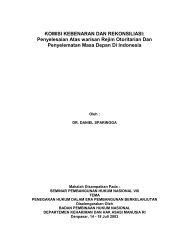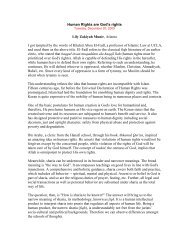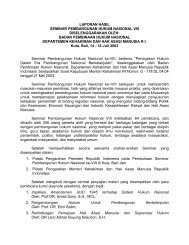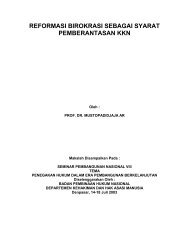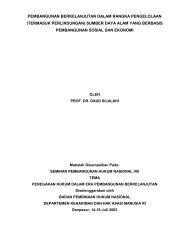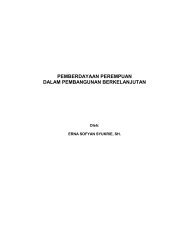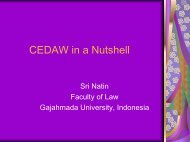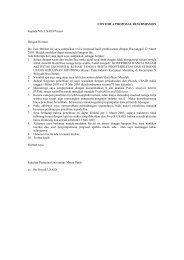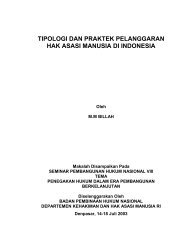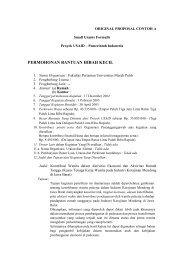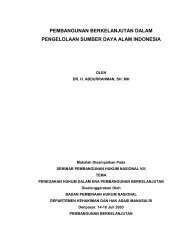Mail Fraud (PDF version) - LFIP
Mail Fraud (PDF version) - LFIP
Mail Fraud (PDF version) - LFIP
Create successful ePaper yourself
Turn your PDF publications into a flip-book with our unique Google optimized e-Paper software.
MAIL FRAUD<br />
• Note that this is a substantive offense<br />
• As in the roast around which you can put<br />
such vegetables as conspiracy or<br />
accomplice (aider and abettor) charges<br />
• Note Rakoff quote on p. 60<br />
• Where was Rakoff a prosecutor What kind<br />
of cases did he prosecute<br />
• What’s his current job description
NOTE THE STATUTE’S TEXT<br />
• See p. 61<br />
• As for the “mailing” element<br />
• What was it in Pereira<br />
• “Where one does an act with knowledge<br />
that the use of the mails will follow in the<br />
ordinary course of business, or where such<br />
use can reasonably be foresee . . . then he<br />
‘causes’ the mails to be used.”
Note HANNIGAN, p. 65-66<br />
• What was missing<br />
• Testimony by a competent witness about<br />
how mailings were made by the company<br />
• Just bring in a witness to testify that it was a<br />
routine practice to use the mail.<br />
• Don’t need someone to testify that “I saw<br />
the thing mailed.”
WIRE FRAUD; Note the statute<br />
at p. 66<br />
• 18 U.S.C. § 1343 require that the communicate<br />
must be "transmitted by means of wire, radio, or<br />
television communication in interstate or foreign<br />
commerce“<br />
• United States v. Davila, 592 F.2d 1261, 1263-64<br />
(5th Cir. 1979) holds that intrastate wire<br />
communication violates wire fraud statute if<br />
routed through another state and if intrastate<br />
communication furthered the scheme<br />
• It’s not necessary to show that defendants knew<br />
there was an interstate transmission.
SAMPSON<br />
• Can mailings that follow the fraud’s<br />
execution be used to convict<br />
• Yes, if integral to the scheme.<br />
• And if the scheme contemplated fraud that<br />
continued after the money had been<br />
pocketed
SCHMUCK<br />
• When was the mailing What did it accomplish<br />
• What was the nature of the fraudulent scheme<br />
• What was needed for the scheme to work<br />
• When was the scheme over<br />
• If the mailing is “innocent of itself”can the crime<br />
be committed<br />
• What if the mailing has occurred afte the fraud has<br />
come to fruition
FIDUCIARY DUTY BREACHES<br />
• George is a big case<br />
• So is McNally<br />
• Also big is 18 U.S.C. sec. 1346 (see p. 80 for text)<br />
• Brumley is a clarification, post-1346 case; it’s a<br />
political issue<br />
• State employees who fail to deliver “honest<br />
services” owed under state law are reached.<br />
• What’s political about mail fraud Can the Feds<br />
swoop in and prosecute corrupt state officials
AN INTENT TO INJURE OR<br />
HARM<br />
• Regent Office Supply and D’Amato both require<br />
proof of an intent to injure or harm.<br />
• A scheme to defraud does not, however, have to<br />
be successful; actual injury is not required.<br />
• But the government must show that some actual<br />
harm or injury was contemplated by the schemer.<br />
D'Amato. “Where the scheme does not cause<br />
injury . . . as its necessary result [there must be<br />
proof] independent of the alleged scheme to show<br />
the defendant's fraudulent intent."
IN D’AMATO<br />
• Look at the Gardner-D’Amato-Unisys<br />
connection; what do you see<br />
• Why was the government trying to drive a<br />
wedge between Gardner and Unisys<br />
• Do you think Gardner really was a rogue<br />
employee<br />
• What about the privilege issue P. 99, n.7
RELIANCE. DO YOU GET<br />
WHAT’S GOING ON<br />
• There is a political battle raging between proconsumer<br />
and pro-business views<br />
• If you’re pro-business, it’s caveat emptor.<br />
• If the swindler targeted a bunch of gullible,<br />
unsophisticate hicks, then blame them for their<br />
troubles<br />
• More sympathetic are courts that aren’t willing to<br />
allow crooks to deceive the weak or ignorant
WHAT ABOUT THIS LITTLE<br />
CONCEPT<br />
• Under the mail fraud statute, however, reliance is<br />
not an element of the offense .... In contrast to<br />
common law fraud, the statute creates no<br />
requirement of detrimental reliance. E.g., Sebago,<br />
Inc. v. Beazer East, Inc., 18 F. Supp. 2d 70, 82 (D.<br />
Mass. 1998) (“This court finds that the line of<br />
cases that decline to read into . . . mail fraud cases<br />
a requirement of actual, detrimental reliance are<br />
most faithful to the statute and, in any event, most<br />
persuasive.”)
BROWN<br />
• Brown suggests the victims should have behaved<br />
differently. "In this case . . . the customers were<br />
fully aware that they were . . . [buying] a home<br />
[in] what they knew to be" a "substantial financial<br />
transaction.”<br />
• Note the opinion refers to "something which the<br />
customer should . . . confirm."<br />
• But since when is negligence, even if shown, a<br />
defense to fraud
BROWN—NOTE THE RELIANCE<br />
ON REASONABLENESS<br />
• See p. 105. Is the “objective standard”<br />
reasonable Where is it in the statute<br />
• Have you ever heard of market<br />
segmentation<br />
• In what part of a city is consumer fraud and<br />
overreaching most prevalent<br />
• Where the rich people live<br />
• In the middle class area Or in the ghetto
ODDLY, IN BROWN<br />
• The victims had only limited opportunities to shop<br />
around, however, and often did not speak English<br />
as their first language.<br />
• Remember the tort idea about “You take your<br />
victim as you find him or her”<br />
• What about that<br />
• Focus on “the reasonable person” exempts from<br />
criminal fraud law those who target the gullible or<br />
defenseless
BROWN AND OTHER CASES<br />
REPRESENT“ACTIVISM”<br />
• Under orthodox view, reliance, whether<br />
reasonable or otherwise, need not be proved<br />
in a mail-fraud case, and damages need not<br />
be shown, nor need any person actually be<br />
defrauded.<br />
• So why are we raising the bar<br />
• Because we want to protect the deceivers<br />
from their victims
LOOK AT POSNER’S RULING<br />
IN EMERY<br />
• A blatant, egregious consumer fraud<br />
• Loan flipping—do you understand what<br />
happened<br />
• Posner hammered the defense and found a<br />
basis for RICO<br />
• Posner is a real conservative, not a Fortune<br />
500 conservative
NOTE PAGE 111<br />
• There Posner blasts the defendant<br />
company’s lawyer for ducking the<br />
devastating question asked at oral argument<br />
• Note that Emery is a civil case<br />
• Note that mail fraud is being used to<br />
leverage a RICO recovery


